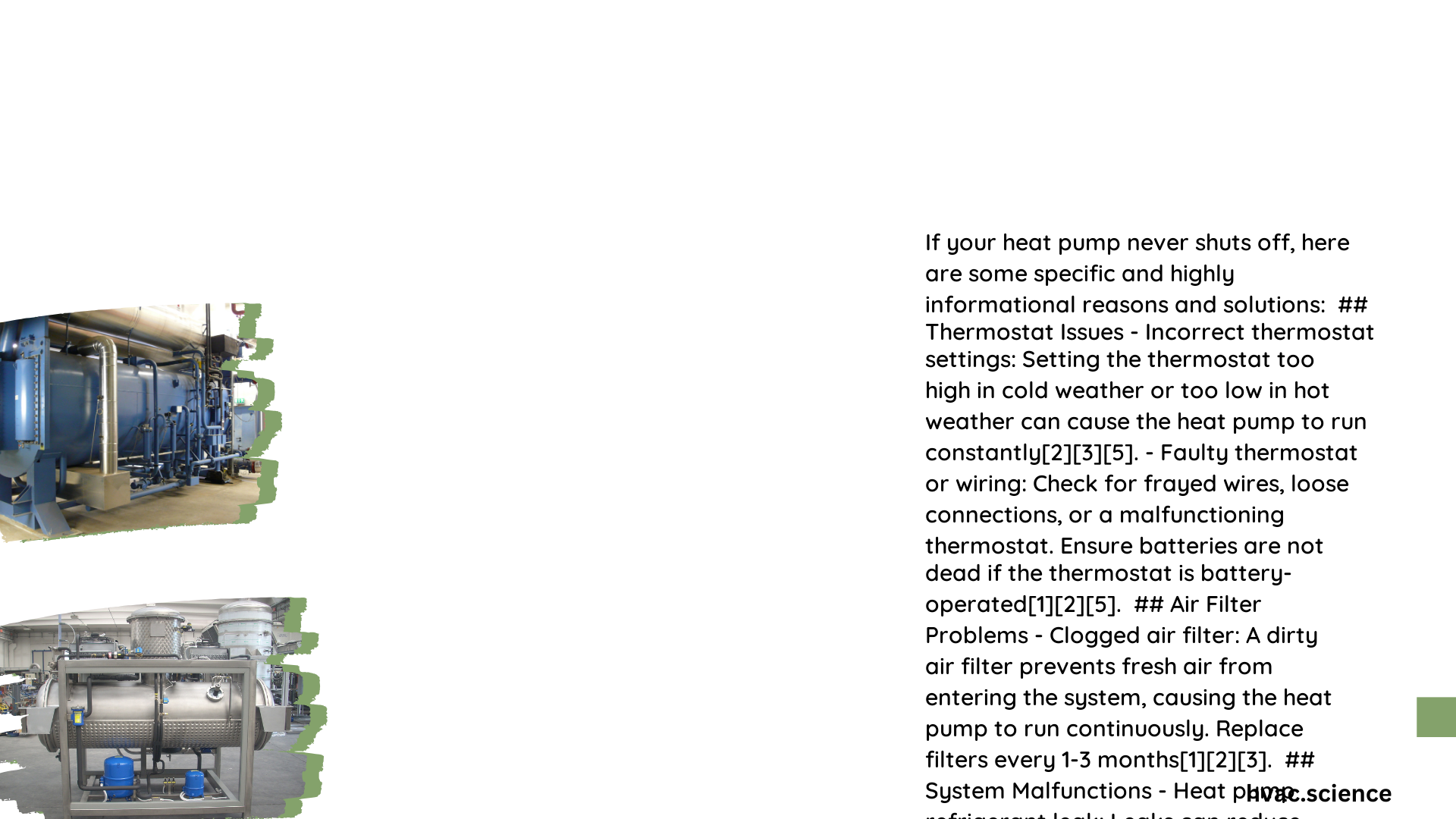A heat pump that never shuts off can lead to increased energy consumption, higher utility bills, and premature wear on system components. This issue often stems from thermostat problems, refrigerant leaks, or undersized equipment. Understanding the causes and implementing proper solutions can help restore efficient operation and extend the lifespan of your heat pump system.
Why Does My Heat Pump Run Continuously?
Several factors can cause a heat pump to run without stopping:
- Incorrect thermostat settings
- Faulty thermostat
- Refrigerant leaks
- Dirty air filters
- Undersized heat pump
- Extreme weather conditions
- Poor insulation
Let’s explore each of these causes in detail.
What Are the Consequences of a Heat Pump That Never Shuts Off?
A heat pump that runs continuously can have several negative impacts:
- Increased energy consumption
- Higher utility bills
- Accelerated wear on components
- Reduced system lifespan
- Decreased indoor comfort
How Does Continuous Operation Affect Energy Consumption?
| Normal Operation | Continuous Operation |
|---|---|
| 2-4 kW | 4-6 kW or more |
Continuous operation can increase energy consumption by 50-100% or more, depending on the system’s size and efficiency.
How Can I Optimize My Thermostat Settings?

Proper thermostat settings are crucial for efficient heat pump operation:
- Winter: Set to 68°F (20°C)
- Summer: Set to 78°F (25°C)
- Use programmable or smart thermostats for automatic adjustments
What Impact Do Optimal Settings Have on Compressor Wear and Energy Costs?
Optimal thermostat settings can:
- Reduce compressor wear by up to 20-30%
- Lower energy costs by 10-20%
- Extend the overall lifespan of the heat pump system
What Are Common Heat Pump Compressor Issues?
Continuous operation can lead to various compressor problems:
- Overheating
- Refrigerant leaks
- Electrical failures
- Mechanical wear
How Can I Diagnose Compressor Problems?
Look for these symptoms:
- Unusual noises (grinding, rattling, or buzzing)
- Reduced heating or cooling performance
- Frequent cycling
- Ice formation on the outdoor unit
Professional diagnostic methods include:
- Refrigerant pressure tests
- Electrical component checks
- Thermal imaging
- Vibration analysis
What Are the Typical Repair Costs for Compressor Issues?
Compressor repair or replacement costs can vary:
- Minor repairs: $200 – $600
- Compressor replacement: $1,000 – $3,000
- Complete system replacement: $4,000 – $8,000
How Does Short Cycling Affect My Heat Pump?
Short cycling occurs when a heat pump turns on and off frequently, often due to:
- Oversized equipment
- Faulty thermostat
- Refrigerant issues
- Dirty air filters
What Is the Normal Frequency of Heat Pump Cycles?
A properly functioning heat pump should cycle:
- 2-3 times per hour
- With 10-15 minutes of runtime per cycle
- Downtime of at least 10 minutes between cycles
How Can I Prevent Short Cycling?
To prevent short cycling:
- Ensure proper heat pump sizing
- Calibrate or replace faulty thermostats
- Maintain clean air filters
- Address refrigerant leaks promptly
- Improve home insulation
What Maintenance Steps Can Prevent a Heat Pump from Running Continuously?
Regular maintenance is key to preventing continuous operation:
- Clean or replace air filters monthly
- Schedule professional maintenance twice a year
- Keep outdoor units clear of debris
- Check and seal ductwork
- Improve home insulation
How Often Should I Schedule Professional Maintenance?
Schedule professional maintenance:
- Spring: Before cooling season
- Fall: Before heating season
This bi-annual schedule helps ensure optimal performance and efficiency year-round.
When Should I Consider Replacing My Heat Pump?
Consider replacement if:
- Your heat pump is over 10-15 years old
- Repair costs exceed 50% of replacement cost
- Energy bills have increased significantly
- The system requires frequent repairs
- Your home’s comfort levels are inconsistent
What Are the Benefits of Upgrading to a New Heat Pump System?
Upgrading can offer:
- Improved energy efficiency (higher SEER and HSPF ratings)
- Better temperature control
- Quieter operation
- Advanced features (variable-speed compressors, smart controls)
- Potential utility rebates and tax incentives
By addressing the issue of a heat pump that never shuts off, you can improve your home’s comfort, reduce energy costs, and extend the lifespan of your HVAC system. Regular maintenance and prompt attention to problems are key to keeping your heat pump running efficiently.
